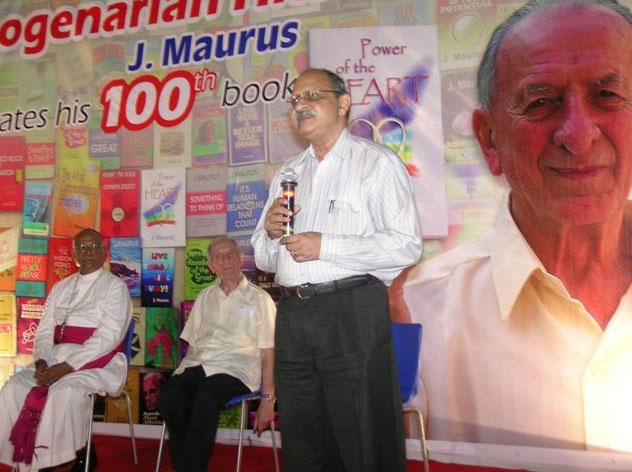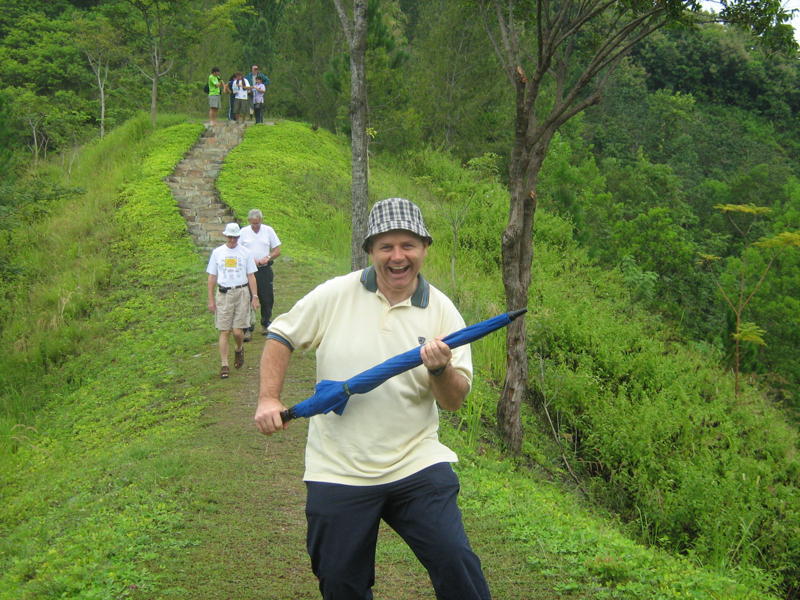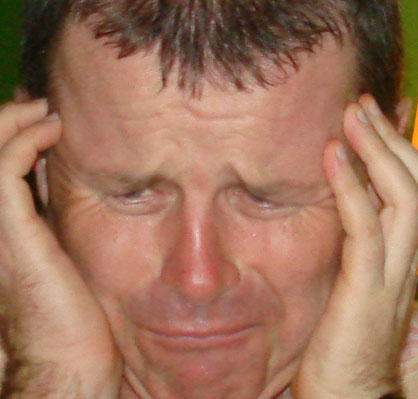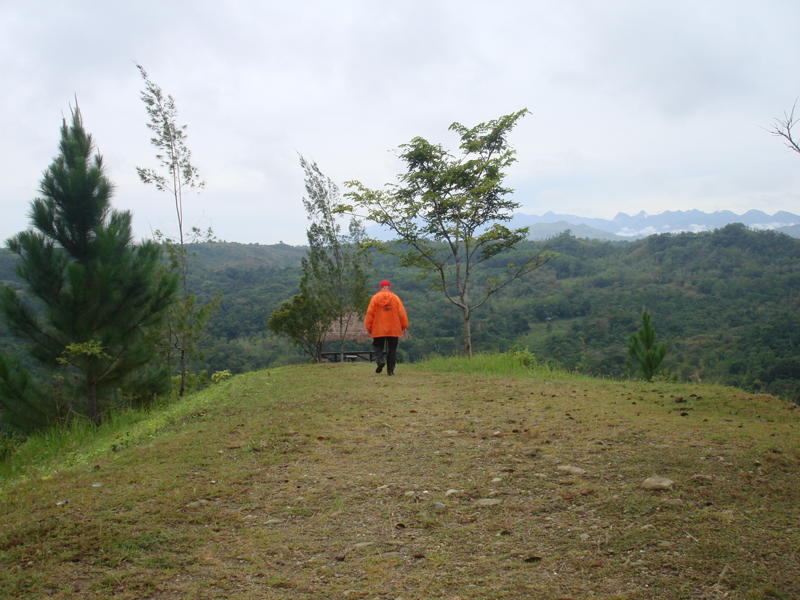Misyon Online - May-June 2010
The Heart That Pumps Water
By Pat McCarthy
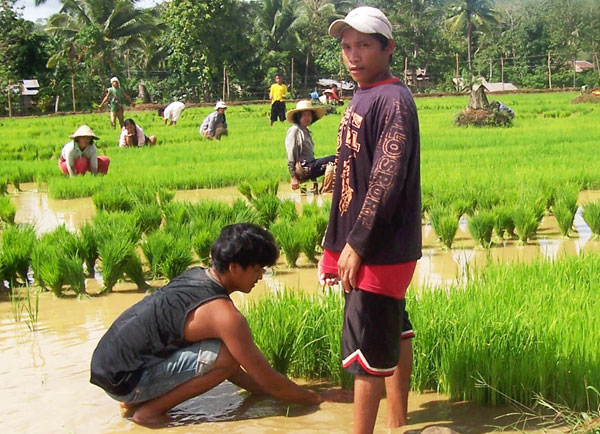 Three rivers flow down the slopes of Mt Pinukis, their waters giving life to
rice and corn crops, and fish farms in the surrounding bays.
Three rivers flow down the slopes of Mt Pinukis, their waters giving life to
rice and corn crops, and fish farms in the surrounding bays.
To the Subanen tribe of Western Mindanao in the Philippines, this dormant volcano is their sacred mountain. To mining companies, it is a potential supply of iron ore, manganese and gold.
An Encounter with Father Mick
By Mary Joy Rile
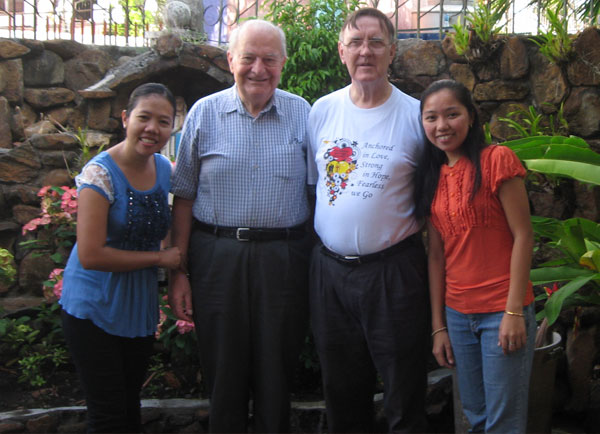 When I was showing the videos and commentaries of people praying for his release, of the different news and updates we gathered as we followed up on his captivity and release, Fr Michael Sinnott could only smile and nod. Who wouldn't be left speechless by those moving videos of children from Hangop Kabataan, his project in Pagadian City, begging for his release and of children of Holy Family Home, Bacolod City, doing the same, added to the many commentaries of concern posted on our websites!
When I was showing the videos and commentaries of people praying for his release, of the different news and updates we gathered as we followed up on his captivity and release, Fr Michael Sinnott could only smile and nod. Who wouldn't be left speechless by those moving videos of children from Hangop Kabataan, his project in Pagadian City, begging for his release and of children of Holy Family Home, Bacolod City, doing the same, added to the many commentaries of concern posted on our websites!
Fr Michael Sinnott: A Valentine with Faith
By Richelle H. Verdeprado
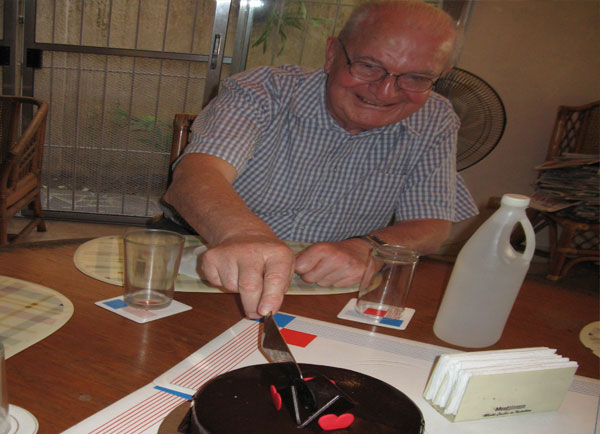 It was the afternoon of February 14. I was sitting down, asking questions, taking down some notes and listening in the best way I could. There was no calm music to create a meditative mood but I was moved. I was reasonably disturbed. As he recalled what took place from October 11 until November 12 last year, he carried me to the forest where he spent many nights. He brought me to the mountains he had hiked and to the seas he had crossed. How come I'm hearing the story of his 32-day rough experience yet I can't find bitterness in his eyes? He must be a very good man.
It was the afternoon of February 14. I was sitting down, asking questions, taking down some notes and listening in the best way I could. There was no calm music to create a meditative mood but I was moved. I was reasonably disturbed. As he recalled what took place from October 11 until November 12 last year, he carried me to the forest where he spent many nights. He brought me to the mountains he had hiked and to the seas he had crossed. How come I'm hearing the story of his 32-day rough experience yet I can't find bitterness in his eyes? He must be a very good man.
Pedaling to Live: The Journey Continues
By Fr Oliver McCrossan
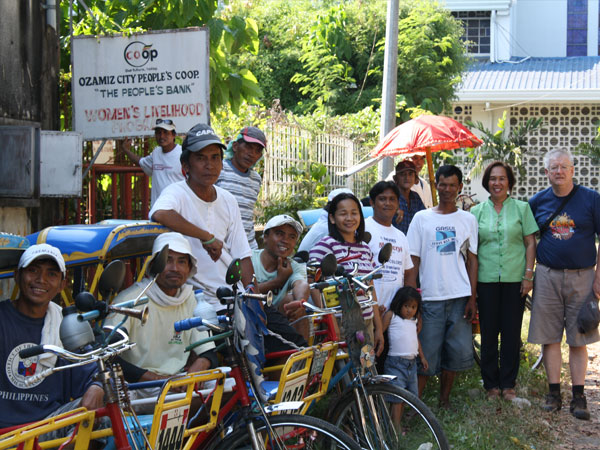 'There are nine million bicycles in Beijing . . .' These are the opening words of a song of Katie Melua. That's Beijing! This is Ozamiz City, Philippines, and there are 74 tricycles, few by Beijing's standards, but providing a reliable, pollution-free transport service for hundreds of people, and a living for the drivers and their families.
'There are nine million bicycles in Beijing . . .' These are the opening words of a song of Katie Melua. That's Beijing! This is Ozamiz City, Philippines, and there are 74 tricycles, few by Beijing's standards, but providing a reliable, pollution-free transport service for hundreds of people, and a living for the drivers and their families.
‘Compadre, alone we might lack many things but together we lack nothing.’
By Fr G. Chris Saenz SSC
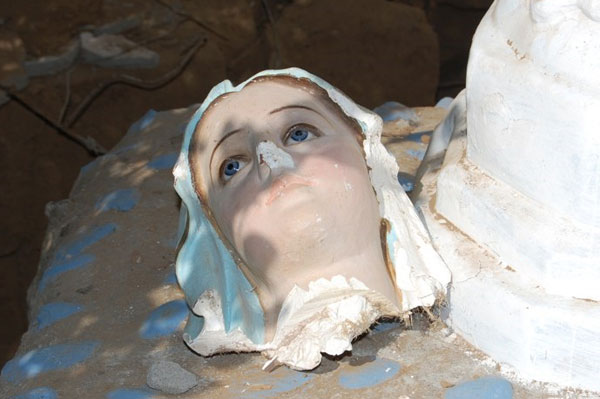 It must have been a missionary impulse that woke me at 3:30am on 27 February 27 in my hotel room in Kansas City. I was in Kansas for a relative's funeral and had a morning flight back to Boston. I awoke feeling a little unsettled. Suddenly, my iPhone buzzed, alerting me of breaking news through its CNN application. I read the caption and was stunned: Chile had been hit with an 8.8 magnitude earthquake! Immediately, I turned on the television to get more news. My heart sank when I heard it was in the south of Chile.
It must have been a missionary impulse that woke me at 3:30am on 27 February 27 in my hotel room in Kansas City. I was in Kansas for a relative's funeral and had a morning flight back to Boston. I awoke feeling a little unsettled. Suddenly, my iPhone buzzed, alerting me of breaking news through its CNN application. I read the caption and was stunned: Chile had been hit with an 8.8 magnitude earthquake! Immediately, I turned on the television to get more news. My heart sank when I heard it was in the south of Chile.
My Mother’s Insight
By Fr Kwon Tae-Moon, Johan
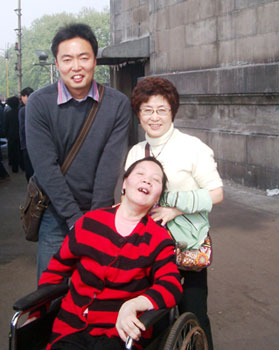 On 3 April 2008 my mother came from Korea to China to see me. My plan wasn't to go sightseeing but to let her see how we Columbans work in China. As a result, we met many of the people whom I was encountering in my ministry.
On 3 April 2008 my mother came from Korea to China to see me. My plan wasn't to go sightseeing but to let her see how we Columbans work in China. As a result, we met many of the people whom I was encountering in my ministry.
With my mother I went to Jingzhou to meet Korean Sisters and others who work with lepers; also to Xiantao to see the Chinese priests and Sisters there. My mother was impressed with their simple lifestyle, especially that of the late Bishop Peter Zhang.
Pulong Ng Editor
An Encounter With Father Mick
By Mary Joy Rile
When I was showing the videos and commentaries of people praying for his release, of the different news and updates we gathered as we followed up on his captivity and release, Fr Michael Sinnott could only smile and nod. Who wouldn't be left speechless by those moving videos of children from Hangop Kabataan, his project in Pagadian City, begging for his release and of children of Holy Family Home, Bacolod City, doing the same, added to the many commentaries of concern posted on our websites! He was amazed at the many affirmations from people, some calling him 'a holy man' and 'a man of peace', and when asked what he could say, he jokingly responded, 'I think I need to go to confession after this.' We laughed but he could not believe those things. His were humbling words that made me admire him more. It appeared to him as if they were talking about a different man. But he also nodded in affirmation when I told him how lucky he is being given the chance to know what people think of him.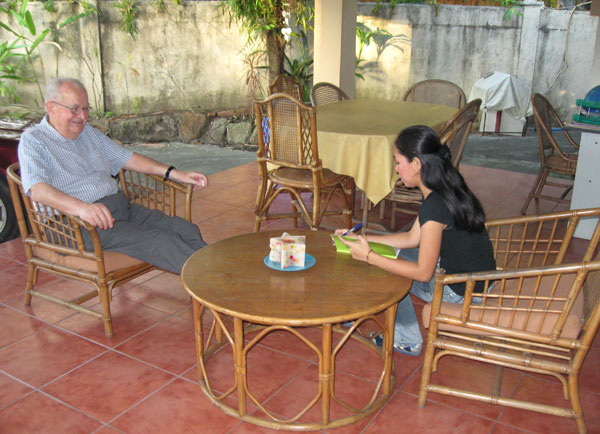
I never knew of Fr Michael Sinnott until I learned of his kidnapping. Being part of the Columban family now that I'm working with Misyon, I caught myself being affected by Father Mick's captivity. The daily updates that we were giving on our website made me feel more part of the experience. I felt for the rest of the world in their concern and love for Father Mick.
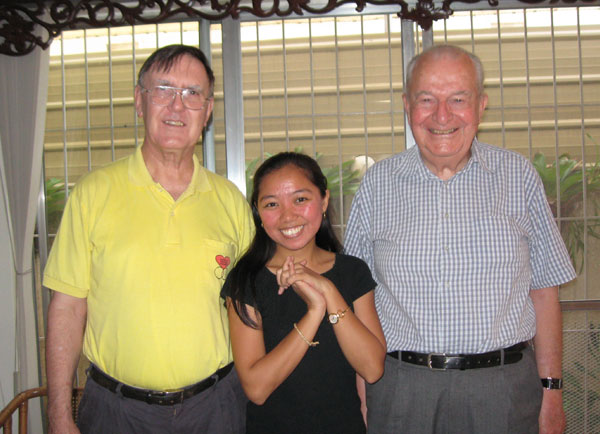
On 20 November I was privileged to see him at the Columban house in Singalong St, Manila, only at a distance. He was fresh from release then and so busy with many interviews. I was so happy and excited to see him so alive and looking well. I could only wish to stay a little longer. Sadly, I had to rush for my travel. I left Singalong a bit broken hearted for not being given the chance of getting near him, even a handshake. All I could do was long for a much more meaningful encounter with him, as I let go of the thought that I was not meant to talk to him then.
When informed of his coming to Bacolod, I was just controlling my excitement until I had my first touch of him at the airport. It was the encounter that I'd been waiting for!
So the afternoon of his arrival, when Father Seán asked me if I would want to interview him right then, I said, 'sure!' with a very big smile. And without hesitation, Father Mick gave his approval. It was an 'ambush' interview with my unprepared questions but it was for me a fulfilling one as I learned from the wisdom of such a man.
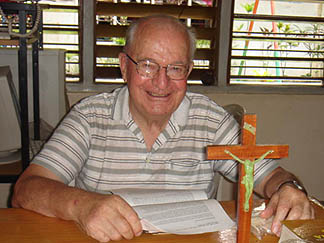
Q: What about your affiliation as a peace advocate?
In the early 1990s, with Bishop Zacharias Jimenez, the Interfaith Forum for Solidarity and Peace was organized in Pagadian. It is a fellowship of the Tri-People: Muslims, Christians and Subanens (Lumads). We have a monthly meeting from 6:30pm-10:00pm. The meeting starts with fellowship - a meal together. Then we start the meeting proper with a prayer and faith sharing. Three to four people share their faith experiences during the past month. Then the meeting proper starts with the reading of the minutes and discussion of social concerns in the Community.
Q: What basically do you do?
We campaign for justice for those who have been killed (eg, especially for the two journalists who were killed) putting pressure on the NBI to investigate. We conduct rallies against drugs and illegal gambling. We issue statements from time to time on issues of social concern. These statements from the Interfaith Group have great influence. Sometimes we ask officials to attend our meeting to discuss problems in the community.
Q: Are you into mediation?
Not really except sometimes people come to us with problems of injustice and we intervene to help them if we find they have a valid case.
Q: You left for Ireland in 1966 but still wishing to come back here to the Philippines. What was then in the Philippines that made you want to come back?
For almost a decade, from 1957 to 1966, I enjoyed working with the people of Mindanao. When I returned in January 1977 I was parish priest in a number of places including Oroquieta City and Aloran in the Archdiocese of Ozamiz and in Dumalinao and San Miguel in the Diocese of Pagadian
Q: What's the best thing being a missionary?
Having established friendships and contacts with Christians, Muslims and Subanens. I have a different outlook on things. It is nice working with people; you have some very good Christians/Muslims, some very bad Christians/Muslims (chuckle!)
Q: What's the most difficult thing being a missionary?
No matter how long you are here, you will never understand the nuances of the culture.
Q: After what happened to you, any plan of going back to Mindanao?
For as long as I can work . . . my heart is there . . . because of the many years I've been here . . . I have already been back in Pagadian for two weeks.
Q: You were so kind to have informed everybody through the media right after your release that your captors were good and kind to you!
They treated me very well. I was comfortable that the people who accompanied me would not harm me. My only worry was that if the military would try to release me by force it would be very difficult to escape unhurt in the small clearances in which we camped.
Q: How were you released?
I think the MILF put pressure on my cap0tors to release me. They told me that due to the intervention of Mr. (Ronaldo) Puno, Secretary of the Department of the Interior and Local Government, blaming the MILF for my captivity, my release was delayed for a week..
The kidnappers called themselves the 'Lost Command'. They were angry with the MILF for saying that it was against the Quoran to kidnap a priest. They said 'it is all right for them because they are getting a lot of money from outside but we have no other way of getting money to buy arms and ammunition except this way'. They made it clear that the kidnapping was for ransom.
Q: How did you feel towards God when you were kidnapped?
At first I was annoyed with the Lord because I found it very hard to pray. I said at least in these circumstances you could give me a sense of devotion and of your closeness. But then I got the conviction that I could safely leave things in his hands and he would take care of me no matter what happened. That is what I did and took each day at a time although there was still dryness in my prayer.
Q: Did you ever think of escaping?
No. There was no way I could find my way out from where we were and besides my captors were fully armed and my chief guard slept in a duyan (hammock) right alongside of me They talked to me in Bisaya (the Cebuano Visayan language) which I understood. But when talking among themselves they used a different language which I did not understand.
Q: I believe it was an opportunity for evangelizing?
They lectured me about their ideologies. They said the Muslims came in 1380 almost two hundred years before the Christians came. When I said that the lumads (tribal people) were here before you, they said 'We are the LUMADS and we converted to Islam. They took our homes and our lands from us and left us to live in poverty. We will fight, and our children will fight, and our children's children will fight until Mindanao is an Independent Islam State with the Quoran for the Constitution and the Religion.'
They said that they would pray to Allah that I would be released quickly and they urged me to pray to my Lord that I be released quickly. Your freedom is also our freedom.
Q: How did you feel when you were released?
It felt very nice to be released, to be free again. I missed the company of people a lot. The days were very long and the nights longer and there was nothing to do all day and there was no communication with the outside world at all. It was nice to get back to the Columban house again.
I was promised that I was going to freedom so many times that I said to myself that I won't believe it any more until I am actually free. So when I was released, I could hardly believe it.
Q: Did you ever think that people were so worried about you?
I felt for Fr Pat O'Donoghue (the Columban superior in the Philippines ) and the bishop (Bishop Emmanuel T. Cabajar CSsR of Pagadian). I knew then that they were worried about me. But I never thought that everybody would learn about my captivity and be so worried about me.
Q: From what happened to you, we saw the value of prayers.
I was amazed to learn when I got out of the coverage the kidnapping got and of the number of people praying for me not only here in the Philippines and in Ireland but all over the world.
Q: We thought that it would widen the gap among the Tri-People but it was actually a way of strengthening the relationship among them.
I learned that a lot of people were really praying for my safe release. And this was not only the Catholics but other Christians and Muslims and Subanens as well. In Pagadian the Catholics said they would say the Divine Mercy prayer for me at 3.00p.m.and the Muslims said they would say 'Azhar Prayer' at 5pm, and the Subanens with their 'Sangat Rituals' at 6pm.
Q: Any opinion as to the MOA-AD (Memorandum of Agreement on Ancestral Domain)? Did it affect the relationship of the Tri-People?
The Muslims were disappointed that the MOA did not push through but the work relations of the Tri-People are good. Even if the MOA-AD was declared unconstitutional, the move is to look for the 'best way forward.' The call for peace-building continues. Mindanao celebrates the Mindanao Week of Peace from end of November into the first week of December.
Q: How do you see the hand of God in that experience?
I was captured, and I did not really know why. God has his own ways and picks peculiar instruments sometimes to achieve his purposes.
Q: Do you feel favored?
I never had any traumas. Didn't have any sickness. Your prayers were really effective…
Q: Any message?
Thanks to everybody, to those who prayed and helped for my release . . . It's very difficult to find words to adequately express my gratitude to them all . . .
I truly felt so privileged to be granted an interview with Fr Michael Sinnott, more so, blessed by such a holy man. He has this aura that's undeniably holy. It exudes such goodness that you would wish yourself to be infected. His silence speaks so much of his simplicity, humility, and peacefulness. He generously gave me a hug after the interview.
Father Mick was the man we'd been praying for. What he had was never his alone but for the world to realize the true existence of God. It brought the world, of different religions, to its knees. He was God's instrument to teach us to pray in faith as a community, as a nation, as a world, once again. It proved to our hearts that hope never leaves as long as we hold on to our faith.
May God, the Creator, bless us that we may all learn to live in peace in co-existence with people of different cultures, of different religions, and in harmony with nature.
You may contact Joy at editorialassistant@misyononline.com
Fr Michael Sinnott: A Valentine With Faith
By Richelle H. Verdeprado
The author will be starting her fourth year as a Social Work student at the University of Negros Occidental - Recoletos (UNO-R) in Bacolod City this June. She has written a number of articles before for Misyon.
It was the afternoon of February 14. I was sitting down, asking questions, taking down some notes and listening in the best way I could. There was no calm music to create a meditative mood but I was moved. I was reasonably disturbed. As he recalled what took place from October 11 until November 12 last year, he carried me to the forest where he spent many nights. He brought me to the mountains he had hiked and to the seas he had crossed. How come I'm hearing the story of his 32-day rough experience yet I can't find bitterness in his eyes? He must be a very good man.
I looked at him again and saw him smile. Now I know why. I was interviewing a great person who had united many people praying for his safe release and their prayers were answered. I was face to face with the 80-year old Irish Columban priest, Father Michael Sinnott, who made me realize what faith, love and forgiveness mean.
I started by asking him what had happened while he was in captivity. He told me how four men, one holding a gun, had forcefully taken him away from the Columban house in Pagadian City. Then he continued sharing about their daily routine, how often they transferred while he lay down covered on the floor of the boat, how many times they had to set up their hammocks again and again, how he lost weight and how he survived. That was how he taught me faith.
'I was confident that they would not do me any harm. I had no medicine and so I thought of my health. There was also a possibility that the military would try to release me by force and it was difficult to see how in that case I could escape unharmed. But I never doubted God's protection. I knew that he would answer my prayers. He would answer our prayers,' said Father Sinnott.
'During those testing moments, days and nights seemed to be longer than usual. You had to look for something to do aside from being keen to the signals and sounds around. You had to keep yourself optimistic that the next view of a mountain would be something that could give hope and not just another mountain to be climb. However, it would be a bit different for persons who loved to do that kind of thing - climb mountains and so on - and are used to it', the priest added.
For Father Sinnott, those long days and nights never shook his faith. He never got tired of saying his personal prayers and finishing the twenty decades of the rosary day after day. It was only his physical body that they had captured, not his heart, not his soul.
There is another story about one of his captors, called 'Kikay', who was always with him and slept in a hammock right alongside him but was good to him. The first day after he was captured, his captors interrogated him and went through his pockets and took everything from him except his Rosary beads and his watch. Kikay said that he could have easily taken the watch except he would not do it without Father Sinnott's permission. After a few days they made an agreement that the day Kikay brought him to freedom Father would give him the watch. As Father Sinnott was about to be freed when they had almost arrived at the seashore Kikay, who was alongside him, put his hand under the tarpaulin which was covering him, snatched his watch, and then pushed him out of the boat into the shallow water. Father Sinnott said that it was fine with him but he would have been happier to personally give it to him as a sign of his appreciation for his kindness and shake hands with him before they parted. He believes that there was goodness in that man waiting to be unleashed. He had let that man and his companions feel unconditional love. Little did I know that I was also being taught what love is.
I began wondering who Father Sinnott was before the kidnapping happened. Why did he choose to be a missionary priest? What I discovered was an interesting story. He closed his eyes for a while, and then continued, 'I felt God was calling me. It started when I was in high school. A missionary priest came to our class as part of a vocation promotion. According to him, there were three things needed to be accepted. You must be of good moral character; you must have average intelligence and good health. Two years later I applied to the Columbans and was accepted.'
It has been 55 years ago since his ordination as a priest in 1954. It was not an easy life and many times he had to carry the crosses of others. It was a life of sacrifice, service and ministry but more than anything else, it was a life of meaning and fullness. Father Sinnott made me realize this when he said, 'I'm very happy and fulfilled as I priest. I never regret that I chose to respond to God's call and I encourage the youth to seriously think about what they are called to do.'
This is another lesson about love. Now, Father Sinnott is back doing what he had dedicated himself to do. He did not extend his Christmas vacation in Ireland nor ask to be transferred to another place. Instead, he is very willing to offer himself again. He continues to be with Hangop Kabataan which is a center he established for children with disabilities in Pagadian City. He continues to help Filipinos in addressing their economic and spiritual concerns. He continues to touch their lives.
I was just sitting down but I traveled a long way. My thoughts, my spirit, my heart . . . they were all moved positively and I'll always thank Fr Seán Coyle, the editor of Misyon, for setting up this interview. I'll always thank Father Sinnott for inspiring me and for teaching me about some of the greatest forces in our life: faith and love.
But here's the third lesson Father Sinnott also taught me: forgiveness. He has forgiven his captors and he hasn't held bad feelings towards them ever since. I asked what he would do if he saw his captors again. What he said struck me, 'I will thank them for being good to me. But I hope I will not meet them in a kidnapping situation'. I agreed with him and we both laughed.
You may contact Richelle at rich_verde706@yahoo.com.ph
My Mother’s Insight
By Fr Kwon Tae-Moon, Johan
Fr Tae-moon Kwon, whose baptismal name is Johan, was ordained in Korea in 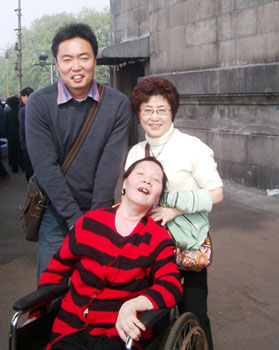 January. He reflects on his mother's visit to China while he was there on his first mission assignment (FMA) with Fr Andrei Paz when they were still seminarians. Both new ordained priests will take up their first missionary assignment as priests in Taiwan in September. The article first appeared in The Far East, the magazine of the Columbans in Australia and New Zealand.
January. He reflects on his mother's visit to China while he was there on his first mission assignment (FMA) with Fr Andrei Paz when they were still seminarians. Both new ordained priests will take up their first missionary assignment as priests in Taiwan in September. The article first appeared in The Far East, the magazine of the Columbans in Australia and New Zealand.
On 3 April 2008 my mother came from Korea to China to see me. My plan wasn't to go sightseeing but to let her see how we Columbans work in China. As a result, we met many of the people whom I was encountering in my ministry.
With my mother I went to Jingzhou to meet Korean Sisters and others who work with lepers; also to Xiantao to see the Chinese priests and Sisters there. My mother was impressed with their simple lifestyle, especially that of the late Bishop Peter Zhang.
One day my mother, a Chinese seminarian and myself went to the first Yangtze Bridge with Yang-Ai. Paralysed at the age of 18, Yang-Ai was now 48. When I escorted her to the church in Wuchang last year, using a wheelchair, she said she wanted to see the First Bridge. She remembered being brought there when she was eight. With our help, her wish of 40 years was finally fulfilled. It was a great moment for me, the Chinese seminarian and my mother.
My mother also met many parishioners in Wuchang church. We had dinner together, took pictures, chatted and listened to the history of the Church in China. She was delighted with the experience.
The last day before she left, my mother said, 'Tae-moon, do you know how happy I am? Now I have the answer to my prayer when I asked what does it all mean. Before you left Korea for your First Mission Assignment, my prayers were entirely for you, but somehow they have changed.
'Now my prayer is not only for you but for all the people you encounter. I did not understand why the object of my prayer had changed in this way because it was not my intention to change it. But now that I have met the people whom you know in China, I understand why I pray like this. Even though I did not know them before, even though I cannot speak Chinese, I feel strongly that they are my family, my children, my sisters, my brothers, my parents and my grandparents.'
When I heard her say this, I was so proud of my mother and the Chinese people I had come to know. I could feel how close she had come to them and how close they were to her as one family in God.
When she went back to Korea I found myself reflecting on her time here. Before I came to China for my First Mission Assignment, I often wondered about the work I could do because of my limitations in the Chinese situation. Here I have met people with mental and physical disabilities, lepers, elderly people, children of poor migrant parents, seminarians, priests, Sisters and the humble and faithful parishioners in Wuchang Church.
These people are exactly the same people whom Jesus helped, loved, often met and ate with, during his time on earth. They treated me and my mother with great love, kindness and hospitality. They eagerly shared their lives with us. Could it be any better? I gain confidence from those people who give me the energy for mission and help me to improve. Even if my pastoral work is restricted by the Chinese Government, God has given me a great sense of love and relationship through his people in this country.
I am grateful for the opportunity to experience God's love, to feel his presence and to realise the extent of his compassion.
Fr Tae-moon Kwon is a Korean Columban. He lived in China for two years as part of his priestly formation.
Our Cover Story
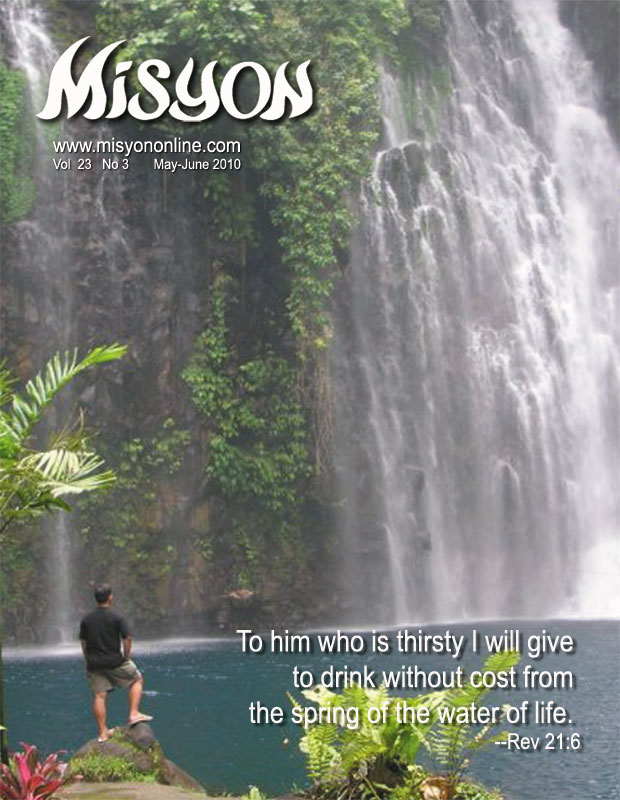
Our cover features the Tinago Falls in Iligan City. It shows a man standing by the falls staring at the flowing water. The falls are comparable to God’s bountiful blessings flowing endlessly. The text from Revelations 21 verse 6, ‘To him who is thirsty I will give to drink without cost from the spring of the water of life,’ tells of God’s reassuring love. It only takes humility for us to approach Him and drink from His spring.
Imagine yourself as the man before the falls. What could be in your mind as you stare at such beauty? Can you see or feel God’s manifestation in it?
Peace By Peace
The greatest challenge of the day is: how to bring about a revolution of the heart, a revolution which has to start with each one of us . . .
Dorothy Day (1897-1980)
You can read more about Dorothy Day, the cause for whose beatification has been introduced, on the website of The Catholic Worker, which she helped to found http://www.catholicworker.org/index.cfm# and on the website of the Dorothy Day Guild. http://dorothydayguild.org/
The proverb says, ‘Where your heart is, there is your treasure.’ Too much attachment to earthly possessions has a strange force of stealing your heart, of depriving you of the simple joy you can find all around you.
Fr J. Maurus SSP
Father Maurus, now in his 80s, is a Pauline priest who has written more than 100 books. (Editor’s note: The ‘proverb’ is from Matthew 6:21and Luke 12:24.)
The human race - every one of us - is the sheep lost in the desert which no longer knows the way. The Son of God will not let this happen; he cannot abandon humanity in so wretched a condition.
Pope Benedict XVI, at his inaugural Mass, 24 April 2005.
Your success and happiness lie in you. External conditions are the accidents of life, its outer trappings. The great enduring realities are love and service. Joy is the holy fire that keeps our purpose warm and our intelligence aglow. Resolve to keep happy, and joy in you shall form an invincible host against difficulty.
Helen Keller (1880 – 1968)
Helen Keller was the first deaf and blind person to earn a Bachelor of Arts degree.
We find greatest joy, not in getting, but in expressing what we are . . . Men do not really live for honors or for pay; their gladness is not the taking and holding, but in doing, the striving, the building, the living. It is a higher joy to teach than to be taught. It is good to get justice, but better to do it; fun to have things but more to make them. The happy man is he who lives the life of love, not for the honors it may bring, but for the life itself.
R.J. Baughan
Six Points for Commonsense Living
- If you drop something, pick it up. Orderliness of mind is the reward of this habit. It will lead you to take better care of persons and things.
- If you open a door, close it. This practice confirms the wisdom of completing each of life's transactions.
- If you make a promise, keep it. Follow this and integrity will be your mark of distinction.
- Whatever you borrow, pay back. This is an extension of keeping a promise. It develops respect for private property.
- Play the thank-you game. In exchanging toys or gifts, say ‘Thank You’ as you expect it from your friends.
- Do nothing to a friend you wouldn't like having him do to you. This is the golden rule that should govern all relationships.
- Do not buy ivory -- under any circumstances. Fifteen years ago there were 1.5 million elephants in Africa. By 1990 they had been reduced to fewer than 750,000, primarily because of slaughtering for ivory. Wild elephants are in danger of entirely disappearing.
- Do not buy tortoiseshell, coral, reptile skins, cat skins, furs and other products of endangered animals. Wild tigers have almost disappeared due to the selling of their skins.
- If you eat tuna, buy only bonita or skyjack tuna. Boycott tuna which are caught through methods that kill dolphins by the thousands. For example, dolphins swim with yellowfin tuna, which are caught by huge purse seine nets that also catch dolphins that die or are killed in the process.
- Source: Promod Batra, Management Thoughts. (From Peace Ideas)
Are You Endangering a Species?
Consumers are ultimately responsible for the irresponsible killing of endangered species around the world. If you wish to be part of the solution, here are some suggestions:
- Source: The Earthworks Group, 50 Simple Things You Can Do to Save the Earth. Hodder and Stoughton Ltd., Mill Road, Dunton Green Sevenoaks, Kent TN13 2YA, U.K.
(From Peace Ideas)
Pedaling To Live: The Journey Continues
By Fr Oliver McCrossan
This report was sent in February by Father McCrossan and the Management Team of 'Pedaling to Live'.
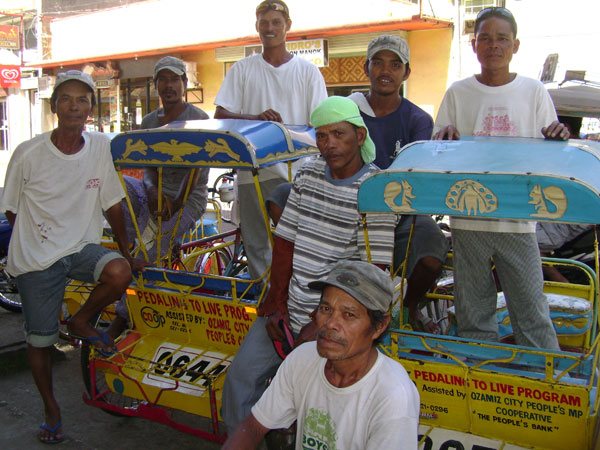
'There are nine million bicycles in Beijing . . .' These are the opening words of a song of Katie Melua. That's Beijing! This is Ozamiz City, Philippines, and there are 74 tricycles, few by Beijing's standards, but providing a reliable, pollution-free transport service for hundreds of people, and a living for the drivers and their families.
Every day the 'Pedaling to Live' drivers, in all kinds of weather, carry young and old to their various destinations around this city. The work is hard, the hours long. Most of the time they receive little thanks or recognition for their outstanding service to the community, but thankfully the public are now growing in appreciation of the sacrifices made on their behalf.
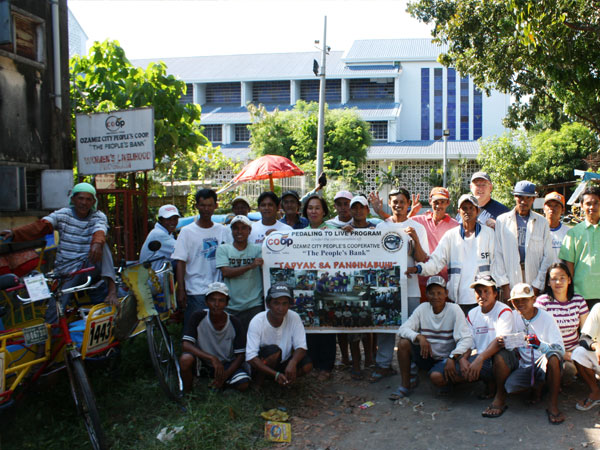
'Pedaling to Live' began in April 2006 with five tricycles. Today we have 74 in operation. 53 are now owned by the drivers themselves. The rest are in the process of completing their payments. The average daily earnings are two hundred and fifty pesos (around US$5.40 or €4.00 a day). They pay back fifty pesos a day towards payment of their tricycle. In addition, the drivers deposit twenty pesos a day in their savings account. They are encouraged to save as much as they can.

In our scholarship program we have 23 children in elementary school, thirteen in high school and two in college.(College fees are expensive). Help is provided to pay for school uniforms, school supplies and tuition fees.
With the help of local health personnel, regular health check-ups are given to the drivers and their families. On occasion during the year we provide vitamins and rice for the children.
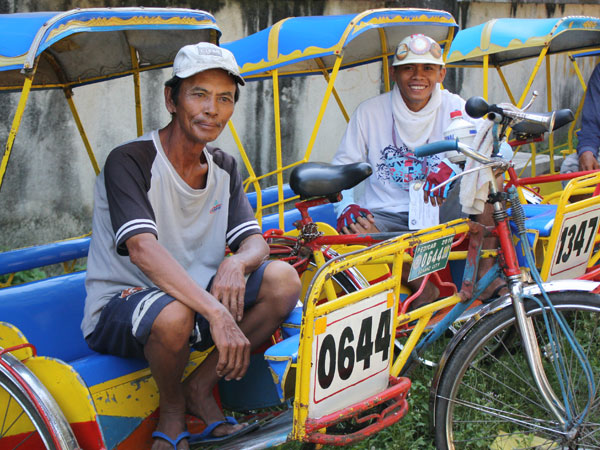
Loans are also available for house repairs. The families are all living in the poorest areas of the city and many of their houses are badly in need of repair.
The drivers meet once a month to review the program and discuss future plans The meetings also help in building support for each other. Twice a year, a two- day recollection takes place. All the drivers and their wives and partners are invited to attend.
Future Plans
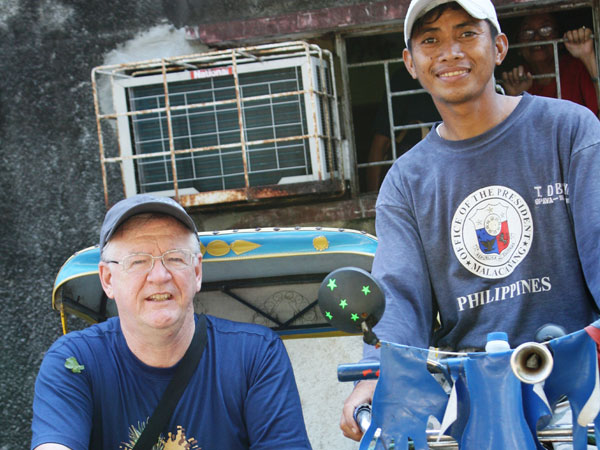
Our plan is to continue to increase the number of tricycles. There is a long list of applicants wishing to join. We have purchased one-fourth of a hectare of land which will be used to provide housing for the members of the program. We will build 40 houses on the site.
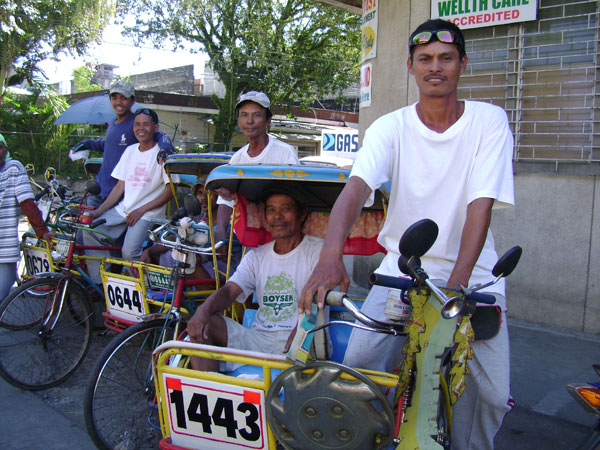
The generous support we have received since the very beginning of 'Pedaling to Live' is a great source of encouragement to us. To our benefactors we say 'Thanks'. It would not have happened without your support.
This April, 2010, we will celebrate our fourth year. The journey continues. May God guide us on the journey.
The Heart That Pumps Water
Pat McCarthy is a well known New Zealand journalist and former editor of NZ Catholic newspaper. Fr Paul Finlayson, featured in the article is a New Zealander, ordained in 1975. He has spent most of his life as a Columban priest in Mindanao.
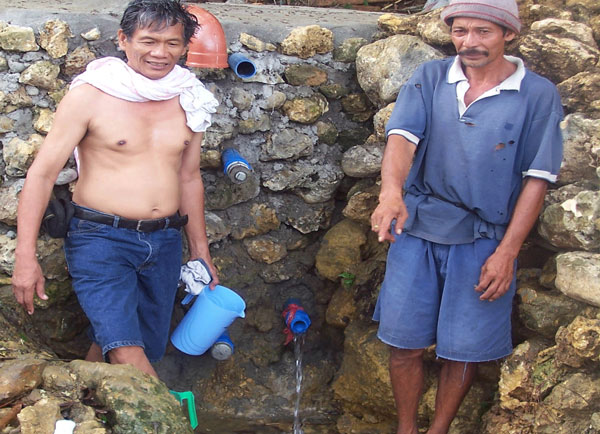
Three rivers flow down the slopes of Mt Pinukis, their waters giving life to rice and corn crops, and fish farms in the surrounding bays.
To the Subanen tribe of Western Mindanao in the Philippines, this dormant volcano is their sacred mountain. To mining companies, it is a potential supply of iron ore, manganese and gold.

To Fr Paul Finlayson, a Columban missionary in the Philippines for most of the last 34 years, opencast mining on Mt Pinukis would be like cutting into the heart of Western Mindanao - the heart that pumps water for four million people in three provinces, providing a livelihood for them and future generations.
For Catholics, even the sacraments are integrated into this environment. Water for Baptism comes from the irrigation canals; oil for anointing and Baptism comes from the forests.
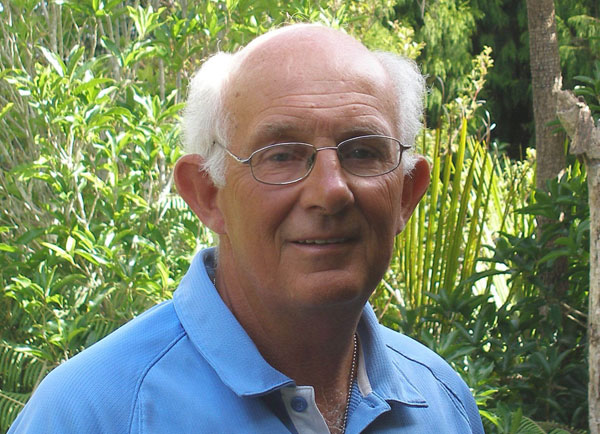
Interviewed shortly before returning to the Philippines after almost two years home in New Zealand, the quiet-spoken Columban admitted he is passionate about creation and protecting the environment.
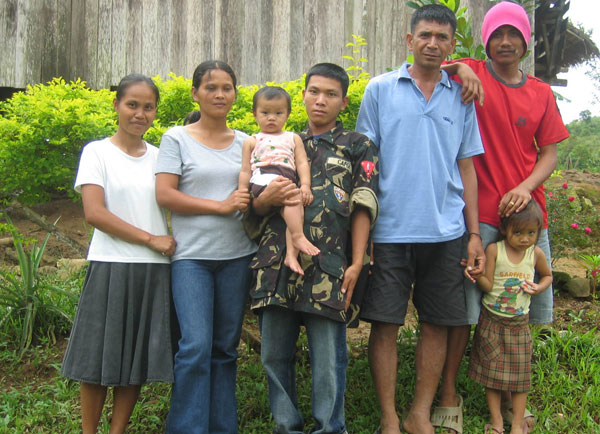
An outdoors man who grew up with beach and farm holidays, tramping, canoeing and planting trees, he gained 'a sense of creation and a sense of the forests, rivers and mountains'.
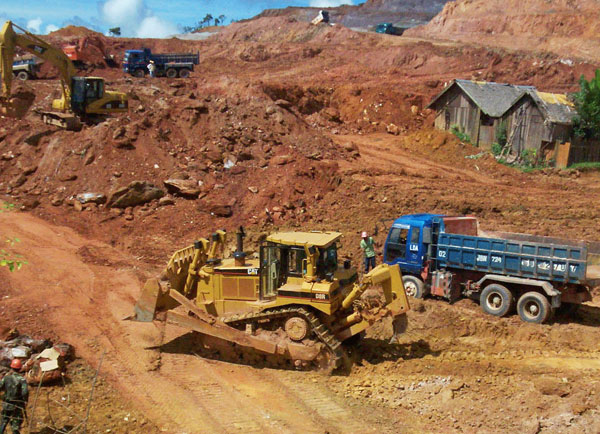
'My charism,' he said, 'is I like the land and the soil and plants and farmers.'
For his most recent six years in Western Mindanao, Fr Paul was the only priest in San Jose parish, Midsalip, with 15,000 parishioners.
'One of the key parts of being in that parish was protecting the environment,' he said. 'The Philippines' population is now 93 or 94 million and probably by the year 2020 it might be 125 million, so protecting food resources is key.'
Unfortunately, Father Paul said, the Philippine government sees mining the
country's rich mineral resources as the way to economic recovery, on the model
of Chile in Latin America.
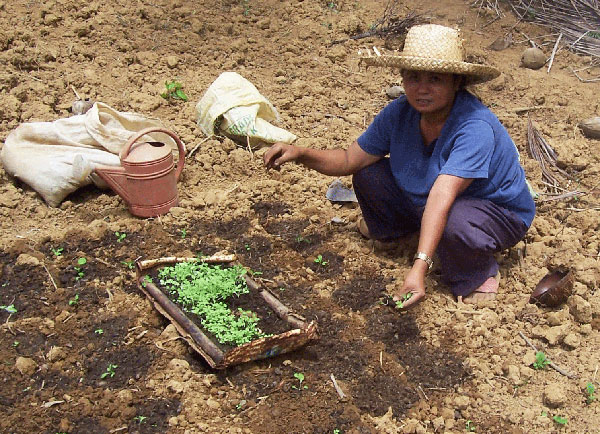
Father Paul said mining companies break existing tribal structures, using bribes to set up their own tribal leaders who will agree to mining. And while the Department of the Environment and Natural Resources is responsible for protecting the environment, it is also responsible for facilitating mining.
He said that once the mining companies got the minerals they wanted, they would disappear. 'The indigenous people would have to evacuate and become ecological or environmental evacuees because their land could no longer support farming and water would be gone.'
Opposition to mining is multi-faceted.
Submissions to government departments, senators and United Nations bodies point out that mining projects are ecologically unsustainable. Networking connects environmentalists, university personnel and sympathetic government employees.
Videos of mining experiences in other parts of the country are shown to local communities. Local people are taken to visit areas that have been mined, to learn first-hand the effects on water systems, crops, fishing and children's health.
A major development followed a 2006 visit by the British MP Clare Short on a fact-finding mission.
'She came twice to Midsalip,' said Father Paul. 'She said to me, "What can I do to be of help to you in this area?"
'I said to her, "I want to do a spatial mapping of the area and if you can help that would be a great contribution".'
Two world-ranking environmental experts, Robert Goodland and Clive Wicks, arrived. Their 273-page report entitled Philippines: Mining or Food?, incorporating spatial mapping by satellites, was published in 2008.
'They said if we could stop the mining our irrigation system for the rice would have water for the next thousand years, but if the mining began we would have water for only seven years,' Father Paul noted.
The authors acknowledged the courage of Catholic 'bishops, priests, sisters and pastoral workers' in opposing the destruction caused by mining.
Father Paul said mining companies employ paramilitary forces to protect their operations.
He didn't want to talk about any personal threat - 'A lot of people are more
vulnerable than I am' - but acknowledged he continually changed the time he
went out on his motorbike.
'Definitely, the people who oppose mining have been under threat and have suffered
consequences. Some of the tribal leaders have been killed.'
As for his own attitude to mining, Father Paul said: 'If you would say I am anti-mining, I would say I am anti-mining in key resource areas because a lot of the areas of biodiversity and mountain ranges are key to the food chain. My personal opinion is that I don't think mining is the way forward in the Philippines. If we were mining there would be a certain amount of dollars that would be coming in, but in the long term economically it is a bad decision.'
Father Paul said his outlook has been particularly influenced by two ecological theologians, American Fr Thomas Berry CP and Australian Fr Denis Edwards.
He also spoke highly of Pope Benedict XVI's World Day of Peace message issued for 1 January 2010 with the heading: 'If you want to cultivate peace, protect creation.'
'I was happy to see his strong stance in terms of our responsibility in our moral and ethical position in terms of future generations. They have a right to the resources,' he said.
'He also mentions the emphasis on creation as being God's gift to all peoples and through the gifts we have a sense of God's care and God's love for us through that creation.
'I would say more so, that the creation is also really the basic sacrament that gives meaning to all the other sacraments - sacraments in the Church like Reconciliation, and not only reconciliation within the family and within the communities or within our different cultures, but also religious traditions, and our reconciliation with the Earth.'
Vocation Page
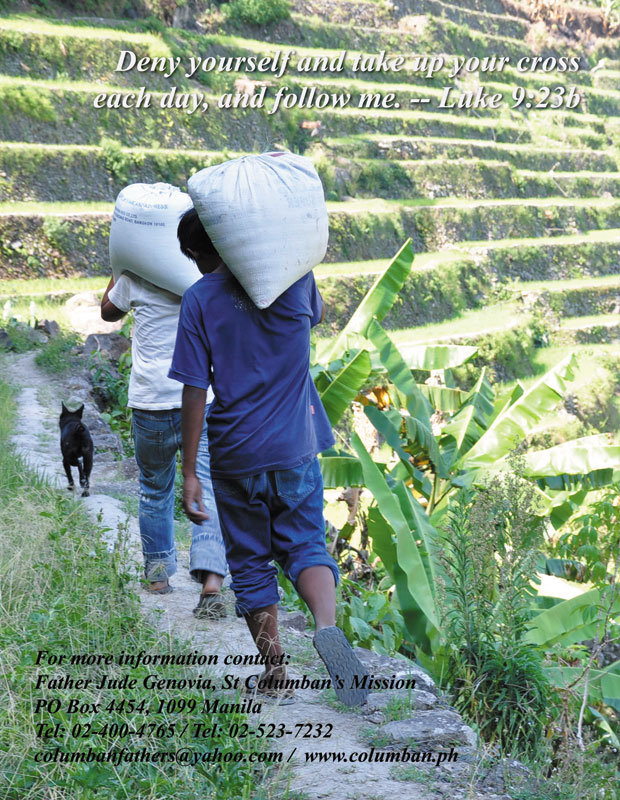
Photo by Fr Rolly Aniscal SSC
Deny yourself and take up your cross each day, and follow me. -- Luke 9:23b
For more information contact:
Father Jude Genovia, St Columban's Mission
PO Box 4454, 1099 Manila
Tel: 02-400-4765 / 02-523-7332
Email: columbanfathers@yahoo.com
Website: www.columban.ph
YASIA FIESTA!
5th Asian Youth Day
By Mary Joy Rile
The author attended the 5th Asian Youth Day as a delegate of Institucion Teresiana (IT) Youth -Philippines.
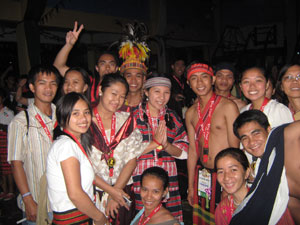 The 5th Asian Youth Day (AYD5) with the theme ‘Young Asians: Come Together, Share the Word, Live the Eucharist’ was held in the Philippines from 20 to 27 November. The first three days were spent for ‘AYD5 Days in the Diocese’ wherein the around 2000 delegates from the different countries in Asia were divided among ten participating dioceses in Luzon. This was to allow the delegates to experience the Church’s youth in action and to be involved in parish youth activities while they were in the care of foster families. 23-27 November were the days for AYD proper.
The 5th Asian Youth Day (AYD5) with the theme ‘Young Asians: Come Together, Share the Word, Live the Eucharist’ was held in the Philippines from 20 to 27 November. The first three days were spent for ‘AYD5 Days in the Diocese’ wherein the around 2000 delegates from the different countries in Asia were divided among ten participating dioceses in Luzon. This was to allow the delegates to experience the Church’s youth in action and to be involved in parish youth activities while they were in the care of foster families. 23-27 November were the days for AYD proper.
On 23 November all the delegates met at Imus, Cavite, the venue for AYD5 2009. YAsia Fiesta opening ceremony started with a Holy Mass. Bishop Luis Antonio Tagle of Imus, Cavite, stressed in his homily that Jesus in the Eucharist gives His everything, His body and blood. Just like Jesus, we should give our all; that’s how we live. We come together to share the Word in wisdom, prudence and strength.
Quoting from Pope John Paul II, he also emphasized that ‘Jesus was born on Asian soil . . . In God’s time, the Word came in fullness and He became in flesh as Asian’, one of us, Young Asians (YAsians).
It was so timely that while we were celebrating AYD5 in Cavite, Philippines, the world also acknowledges the 2009 CNN Hero of the Year, Efren Peñaflorida, a native of Cavite.
The Masses celebrated each day beautifully incorporated the readings of the texts and the prayers of the faithful in different languages with the English translations being flashed on the screens. The formulated morning prayers centered on the main text of the celebration, The Multiplication of the Loaves (Jn 6:1-15). It was re-enacted solemnly using rice, as the staple food of Asia. Also, Bishop Rolly Tirona of Infanta, Isabela, describing YAsians as Rich in Christ’s Experiences, with ‘RICE’ as an acronym for this. ‘As we eat the rice and receive nourishment from it, may we YAsians become effective resource of our respective churches and countries.’
Another highlight was the expression of ‘The Word in Many Religions in Asia’ through the reading of the Golden Rule in different Asian Religious Traditions – Christianity, Buddhism, Confucianism, Hinduism, Shintoism – as incorporated in the inter-religious morning prayer.
The plenary sessions provided us with much knowledge in understanding and valuing more the Eucharist. Bishop Cornelius Sim of Brunei-Darussalam spoke on the topic, ‘YAsians, Come Together and Celebrate the Word’ on 24 November. He emphasized that in order for us to know our identity, we need to know who we are called to be and how must we live out the call. He led us to the realization of God’s call for us considering the challenge of modernity and globalization, and of how the world is confronting us with paradoxes.
How can we bring the mind of Jesus to bear on the many issues of this world? We find the answers in the Word that we can rely on – the Bible! ‘Man does not live on bread alone, but on every Word that comes from the mouth of God.’ Reiterating the story of the Road to Emmaus, Bishop Sim said that we must be attentive to God’s works or else we might miss out on the graces just like the two men.
We are most assured that we have something within us, a tremendous music that we can share with others. And that very music that we carry within us is Jesus; no one can take that away from us.
The topic ‘YAsians, Love and Live the Eucharist’ on 25 November was expounded by Archbishop Dominic Jala SDB of Shillong, India. He explained to us the importance of the Holy Eucharist. We are encouraged to participate in the Sacrifice of the Mass as well as to have faith and believe in its Mystery. ‘Beyond the Mass, we adore the Eucharistic Lord and the Eucharist overflows into social commitment.’
We are called to live the Mystery which we celebrate in the Holy Eucharist. Just as we are being sent out in Mission at the end of the Mass, we are to share the gift that we receive. We are called to ‘transform the world by the power He (God) gives us.’
On 26 November Joseph Cardinal Zen SDB of Hong Kong (China) expatiated on the topic ‘Mission: Road of the Word and Eucharist.’ ‘How many of our contemporaries are empty, fearful in the desperate search for meaning?’ was a question he posed to the YAsians. He encouraged us to tell everyone that God exists and not to be ashamed in telling people that we have the Truth. ‘Anyone who has discovered Christ must lead others as well.’ The world needs a renewal, a transformation. And ‘Youth,’ he continued, ‘you still have hands to offer and to use generously. You represent the youth of this generation, the enthusiasm . . . to be Heroes of Mission.’
Together with his strong words of invitation to the youth was the recognition that to be heroes of Mission on the Roads to the Word and the Eucharist is a great challenge that we cannot fulfill on our own. We rather need the Holy Spirit to strengthen us.
Citing the atheistic regime of China that is greatly threatening to our priests and religious, he appealed to us that they need our help, our prayers, our encouragement for them to be faithful and to be firm. He explained further, ‘Nobody is entitled to martyrdom. And we don’t push anybody to it. Martyrdom is a gift . . .’
The Hardships as Pilgrims
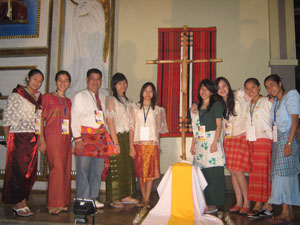 People just can’t avoid but complain about the transportation. We were made to wait long before the buses arrived. Especially on the first night, there were even unclear instructions as to how we could get back to our accommodation sites. Because of the delays in transportation, the hours for rest were shortened. We went to bed very late, even after midnight, and then had to get up very early as we were expected to leave for Rogationist College, the main venue for AYD5, at 6:30am.
People just can’t avoid but complain about the transportation. We were made to wait long before the buses arrived. Especially on the first night, there were even unclear instructions as to how we could get back to our accommodation sites. Because of the delays in transportation, the hours for rest were shortened. We went to bed very late, even after midnight, and then had to get up very early as we were expected to leave for Rogationist College, the main venue for AYD5, at 6:30am.
A language barrier was another thing that we had to bear. During the sharing we could sense the uneasiness of those who could hardly speak English. They wanted to share far more but just couldn’t express themselves. Sometimes we interpreted their gestures, and they were able to confirm the accuracy of the meaning we took from them.
A pilgrimage as part of the opening ceremony of AYD5 was such a good thing but there were cases of dehydration and over-fatigue for those who were unprepared for the long walk, along with the long and tiring night.
To those who stayed after the closing ceremony on 27 November, the Post-AYD5 Pilgrimage was another challenging experience for them to ponder as pilgrims for they were left with no accommodation after it. Others just stayed in the Rogationist College gymnasium waiting for daybreak.
The Joys of Sharing
The youth’s favorite was the meeting of new friends from different nations and different cultures. We were caught with a language barrier but that didn’t stop us from conversing and even learning a few words of other languages. The enthusiasm of the youth prevailed. The volunteering spirit was visible as they offered assistance to the organizing team.
We were made aware of other nations’ social concerns through the sharing and presentations. The forum provided the venue for some suggestions coming from different perspectives on how to go about certain issues.
Picture-taking was fun as we shared remembrances through photos. We’ve been sharing photos over the net and looking at those photos enlivens the AYD5 spirit in us. Keeping in touch through emails, Facebook, Friendster and other online social networking allows us to continue the friendships.
The beauty of learning on such an occasion is truly worth reminiscing about.
Worth Remembering
Sub-Regional Sessions – I was assigned to Southeast Asia 1 sub-region. We had a sharing on our ‘personal’ Bible – ‘The Good News in My Life’. Volunteering to be the secretary in our circles was for me a privilege as I was able to note every individual’s sharing.
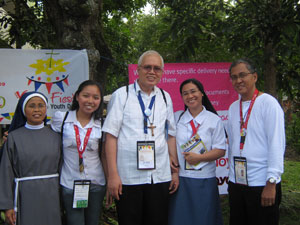 Gallery Walk: YAsia Peria! – Through the exhibits, we had a taste of the richness and culture of every participating country during the AYD. It was fun and exciting roaming around with your cluster group checking various cultures with the informative exhibits, delicacies, games, dancing and the playing of musical instruments, and picture-taking of others wearing their native costumes!
Gallery Walk: YAsia Peria! – Through the exhibits, we had a taste of the richness and culture of every participating country during the AYD. It was fun and exciting roaming around with your cluster group checking various cultures with the informative exhibits, delicacies, games, dancing and the playing of musical instruments, and picture-taking of others wearing their native costumes!
Liturgical Concert – This displayed the talents and liveliness of Filipinos through different musical presentations. What was so striking for me that night was the dramatic flag procession, especially when flags were waved in a special way giving honor to Our Lady as her image was being carried on stage.
YAsian Walk (with Mass Integrated): ‘Taken, Blessed, Broken, Shared’ – This was a creative celebration of the Holy Eucharist at five stations. Walking from station to station gave us the chance to listen to the reflections of the priests and to share our own personal experiences. We also shared about what we were willing to give to God for Him to multiply, after which we wrote our intention on a piece of paper and placed it inside a bamboo pole. Later, the poles were formed into an altar where the Mass was to be concluded. Bishop Joel Baylon, the main celebrant, shared with us three actions that we need to do being missionaries: arise, go and stay. Being sent on a mission, whenever we are gathered together we need to arise. We must go to continue the Mission. But at particular moments in our lives, we are called to stay with family, friends, or others because it is from among them that we can find other ‘delegates’ to do God’s work. ‘We have a mission to fulfill because that is who we are.’
Vigil – This incorporated the Adoration and Taizé Prayer led by the Brothers of Taizé. During the veneration of the Cross, there were on-going Confession and Counseling. Truly it was a heart-warming experience of reconciliation, with God manifesting himself according to the need of each person present.
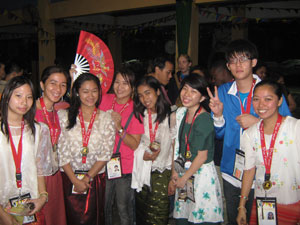 Youth-Sharing: YAsian Heroes in Mission – Representatives from different nations shared the major concerns of their country and how they address such. A fruitful open forum followed. But what really struck me during the forum was when the news of the Maguindanao Massacre on 23 November was brought up through a question raised. Fr Efren Reyes of Mindanao clarified that it was politically motivated and had nothing to do with the Indigenous-Muslim-Christian conflict. This was later affirmed in the workshop which I attended.
Youth-Sharing: YAsian Heroes in Mission – Representatives from different nations shared the major concerns of their country and how they address such. A fruitful open forum followed. But what really struck me during the forum was when the news of the Maguindanao Massacre on 23 November was brought up through a question raised. Fr Efren Reyes of Mindanao clarified that it was politically motivated and had nothing to do with the Indigenous-Muslim-Christian conflict. This was later affirmed in the workshop which I attended.
Workshop on Interfaith Dialogue – Being a Filipino concerned about the Mindanao conflict, it felt good to hear directly from a Muslim, Bailinda Eman, the only Muslim present at AYD, affirming that religion is not the reason for the conflicts in Mindanao. The main purpose of Interfaith Dialogue is to build relationships. In order to achieve this, we just need to respect each other. We only need to open our hearts and listen.
Grand YAsia Fiesta – This was a night of such a spectacular display of Asian cultures! The cultural presentations were greatly entertaining. Everybody was wearing their native costume. Indeed the pride of national identity was extraordinary before the big crowd of many nationalities. The more we get to appreciate our very own.
Closing Ceremony – We were graced with such a big number of priests and bishops present in the house and with the presence of Archbishop Edward Joseph Adams, Papal Nuncio to the Philippines, bringing a message from Pope Benedict XVI. We felt so blessed as we were sent out back to our different countries with the thought of becoming witnesses to Christ.
One of the things that captured the crowd’s heart and attention was when Bishop Tagle of the Diocese of Imus expressed his heartfelt gratitude to all those who helped towards the success of AYD5. His heart was so overflowing in gratefulness that he even shed tears which made many of us almost teary-eyed also.
Everybody rejoiced at the announcement of the next Asian Youth Day to be held in Korea in 2012.
Some links
Video of AYD Theme Song: http://www.cathnewsphil.com/2010/01/07/5th-asian-youth-day-theme-song-mtv/, the Rogationist College’s interpretation of the theme song of the 5th Asian Youth Day. The song was composed by Father Mimo Perez and sung by Geli P. Federoso. The MTV was directed by Ritchel B. Ybañez and produced by the Rogationist Fathers in Silang, Cavite.
Website of Asian Youth Day 2009: http://www.asianyouthday2009.com/
AYD5 Logo: http://yasiafiesta.multiply.com/journal/item/1
You may email Joy at editorialassistant@misyononline.com
‘Compadre, Alone We Might Lack Many Things But Together We Lack Nothing.’
By Fr G. Chris Saenz SSC
An American Columban, working with our seminarians in Chile, reflects on the spirit of the Chilean people in the aftermath of the major earthquake that hit that country on 27 February.

It must have been a missionary impulse that woke me at 3:30am on 27 February 27 in my hotel room in Kansas City. I was in Kansas for a relative's funeral and had a morning flight back to Boston. I awoke feeling a little unsettled. Suddenly, my iPhone buzzed, alerting me of breaking news through its CNN application. I read the caption and was stunned: Chile had been hit with an 8.8 magnitude earthquake! Immediately, I turned on the television to get more news. My heart sank when I heard it was in the south of Chile.
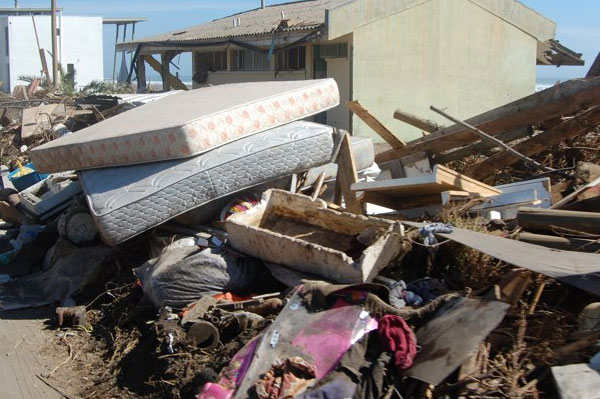
I had worked six years in southern Chile and I knew the affected areas and many people who lived there. My godson's family lives in Coronel, which is about 32 kilometers south of Concepción. I feared the worst because of Chile's history with terrible earthquakes. The place where I worked, Puerto Saavedra, holds in its memory the 1960 9.5 magnitude earthquake which produced a tsunami that nearly destroyed the entire town and killed 18 people. Years later, people still lived with post-traumatic shock of that earthquake. Any tremors caused people to shake, break out in tears and run to the hills. Now this recent earthquake will be another reminder of the fragility of people's lives in such areas. Many described the experience as being 'tossed up and down like an egg on a skillet'. The quake lasted for two minutes but for those who experienced, it was an eternity. A woman told me, 'I just held on to my child and prayed to God with all my might!' I feared for my friends' safety - physical, mental and spiritual.
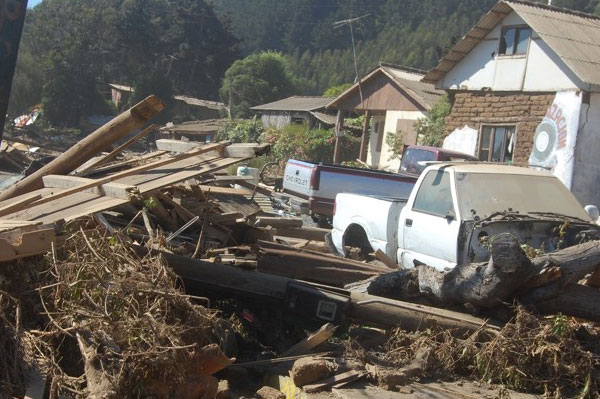
Yet, I also know the Chilean people's spirit. Often criticized by other Latin American countries as being overly nationalistic and patriotic (many Chileans carry the Chilean flag with them when they leave the country) Chileans have a great sense of unity in face of great challenges. The fragile history of the earthquakes has prepared the Chilean people for such events. They have stricter building codes and better infrastructure than most Latin American countries and they react faster to tsunami warnings.
However, their spirit goes beyond these basic preparations. Over the next few days, I received word from my friends over Facebook or through phone calls about how they are struggling to bring back normalcy to their lives and trying to re-establish order. Communities organized to protect their neighbors' homes from looters and shared food resources. Some communities have set up a common food pantry and soup kitchen to help one another. As Oscar, my godson's father, said, 'Compadre, alone we might lack many things but together we lack nothing.'
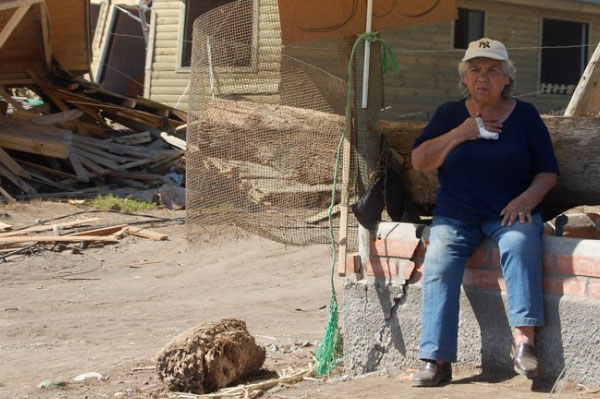
I was greatly pleased to hear that a prison in Santiago donated a day of its food rations to those who needed them most. In a phone call to Maritza, a young woman who used to be in my youth group many years ago, I discovered that with her father Maritza was traveling to a nearby small town with food supplies for those in need. Maritza is a poor indigenous farmer who does not have much. Yet, she gives to others from her little harvest.
That is the spirit of the people in Chile! And, imagine all of this is being done by the Chilean people's initiative and is not part of the national or international relief efforts that has followed the earthquake.

In spite of this spirit and unity, there is still much that needs to be done. I talked to Sister Ana Maria, a friend of mine, who was with her family in Lota, near the epicenter. She was worried for her father, Alfredo, who is a diabetic. Unfortunately, because of the looters, most pharmacies were sacked and medicine is hard to come by. Alfredo needs his medicine and many others need their medical prescriptions. Also, food supplies, blankets, tents and power generators would greatly help. There are still strong aftershocks and many people have not returned home. Camps are still being set up. So any help with those needs would be greatly appreciated.

In closing, I would like to say that Chile is a country of great unity in times of crisis. The people give us an example of sacrifice and belonging. Hopefully, that example can inspire us to do same for those most in need in Chile. Please help in whatever way you can. God bless.
Father Saenz, from Nebraska, USA, was ordained in 2000. He spent some time in Manila while preparing for the priesthood and has contributed a number of articles to Misyon. You may email him at gchris.saenz@gmail.com
Father Joeker
Father Bushman

Schiphol Airport, Amsterdam. To give the impression that I too am a city man, I walked proudly and with confidence toward the door. Suddenly the door opened automatically. Frightened, I jumped backward, my other hand-carried bag dangling at my back. I looked around and saw people laughing and I nodded to them, apologizing with a smile, “Forgive the bush man from Africa.”
Spiritual Competition

Twice my malaria sent me to two hospitals. At first hospital run by Medical Sisters, a group of Protestant Charismatic, unaware that I was a Catholic Priest, came to pray over me. After them came the Catholic Charismatic group. I got well but the problem was I did not know whose prayer made me well.
Eight Miles from Here...

Watching a group of women carrying water. I asked casually of my guide. “How far away do they get the water?” About eight miles from here. Water is really a problem here father. When those women arrive in the village, they will be so tired and so thirsty that they will drink all the water they carried.” And they will go back again?” I asked. “Yes”, said the concerned guide.
I like Fufu

Fufu is Ghana’s staple food. It is made of mashed yam and cassava and plantain and eaten with stew. On my way back from home leave, inside the plane, I was seated between two Ghanaians. Before our meal was served, I casually told my Ghanaian seatmate to my left, “I like Fufu you know?” it caught him so much that he leaned over to me, looked at my skin and exploded: “no wonder we have the same color.”

